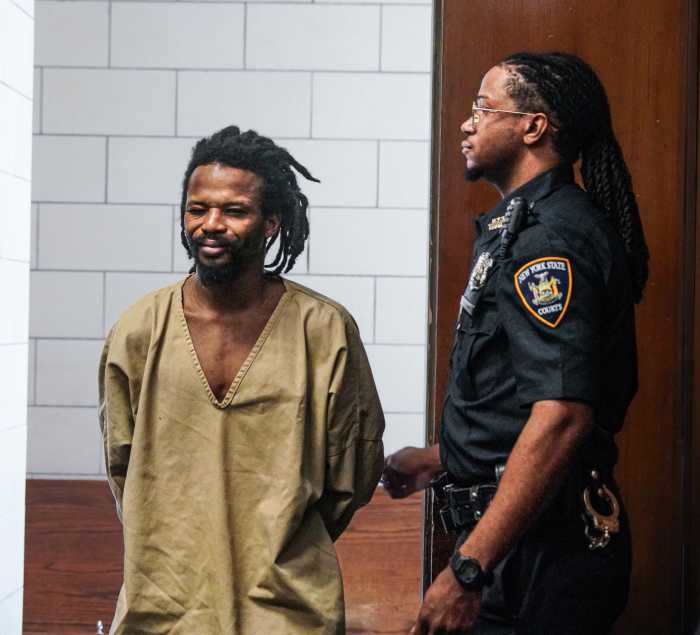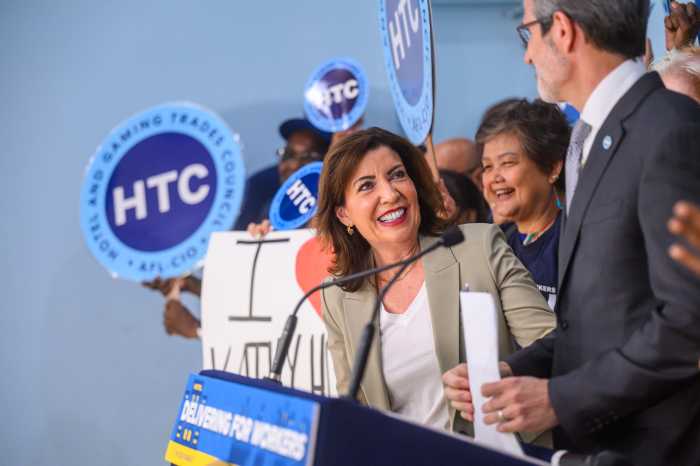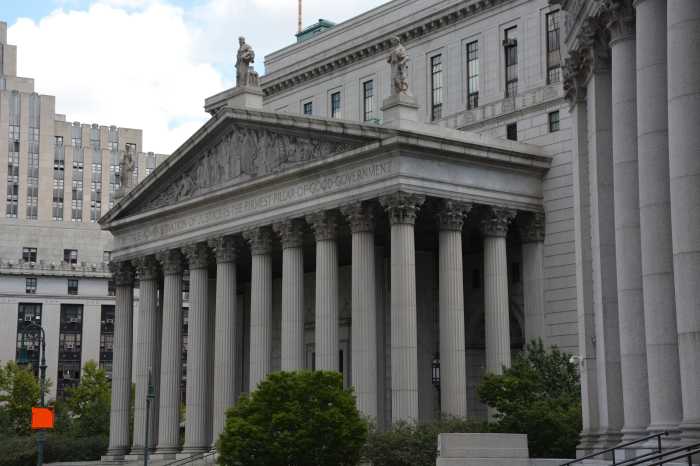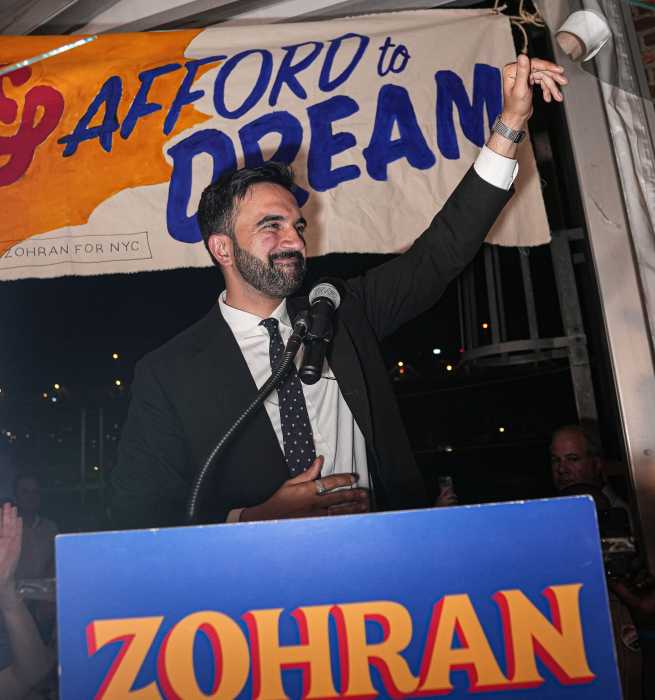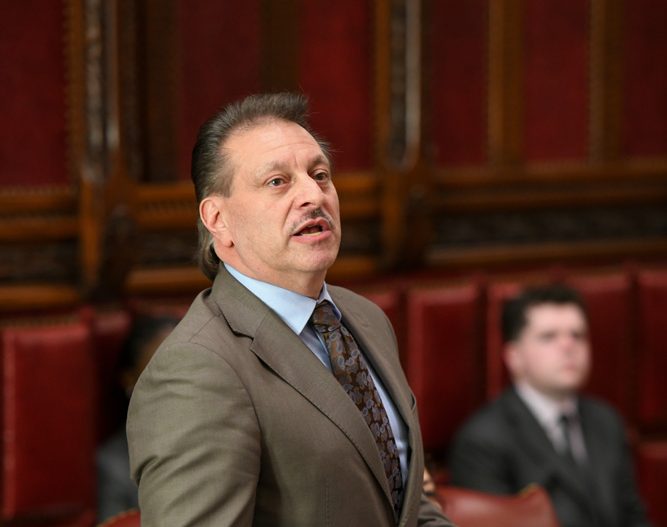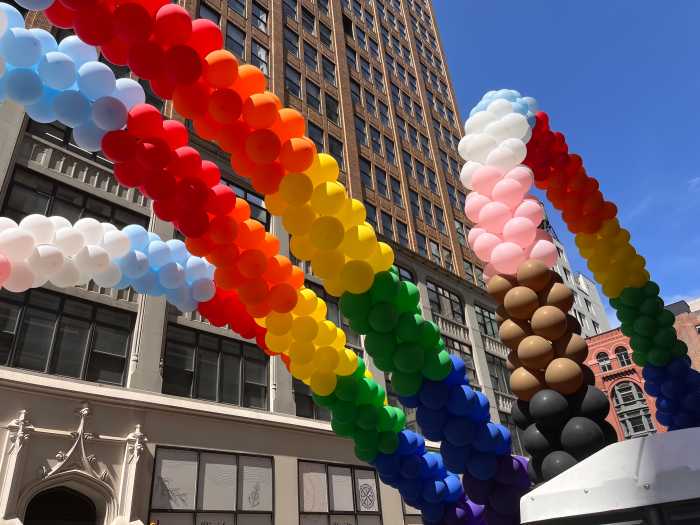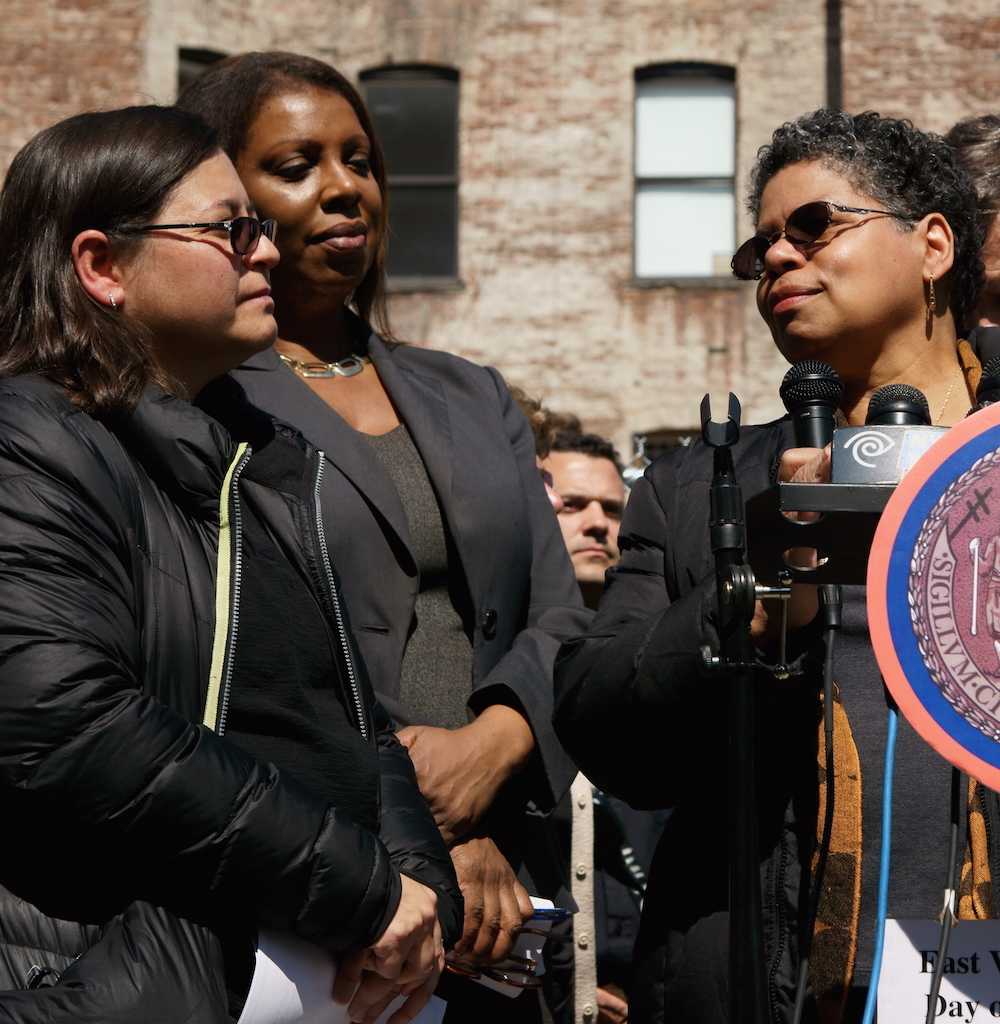
BY TINA BENITEZ-EVES | To mark the one-year anniversary of the catastrophic gas explosion that killed two men and ignited a raging inferno that destroyed three East Village tenements, Councilmember Rosie Mendez and other local politicians and agency officials on Saturday held a “Day of Remembrance” press conference outside the tragic site.
Reverend Jacqui Lewis, senior minister of Middle Collegiate Church, gave the opening remarks and led the crowd in a moment of silence for the two victims, Moises Locón, 27, and Nicholas Figueroa, 23.
In addition to individuals who were displaced after the calamity, also on hand were firefighters and other first responders — including Ladder Company 9, Engine Company 3 and local volunteer Community Emergency Response Team, or CERT, team members — who rushed to the scene of the disaster one year ago.
“We can never forget the tragedies that were avoidable, and we vow to work to ensure that no one else has to suffer and endure what the families and our communities have,” Mendez said.
Mendez said that many of the affected former tenants still remain homeless.
“We hope they can find the place they need to continue on the path toward healing,” she said.
In total, 30 families were displaced and six families have since moved out of state.
On that fateful day, Mildred Guy lost her home of 45 years at 119 Second Ave., which collapsed along with 121 and 123 Second Ave.
At the press conference, Guy tearfully recalled the shock of learning her family’s home — which her kids fondly knew as “Mommy’s Place” — was gone. She had lived there for most of her life in a multigenerational household.
Yet, Guy said, she also felt grateful that her elderly mother, who was wheelchair bound, had passed away before the explosion happened, and that her grandson was not asleep inside the apartment, since her son had moved out with his family only shortly before the blast.
“I feel grateful and blessed,” Guy said. “So many people opened their arms, offered prayers, support and their homes.”
“The empty lots behind me where three buildings once stood are a constant reminder of a fatal incident that could have been prevented,” Mendez said. “What appears to me to be a blatant disregard for human life was led by greed and brought a heightened awareness to the city of individuals putting the well-being of others in jeopardy.”
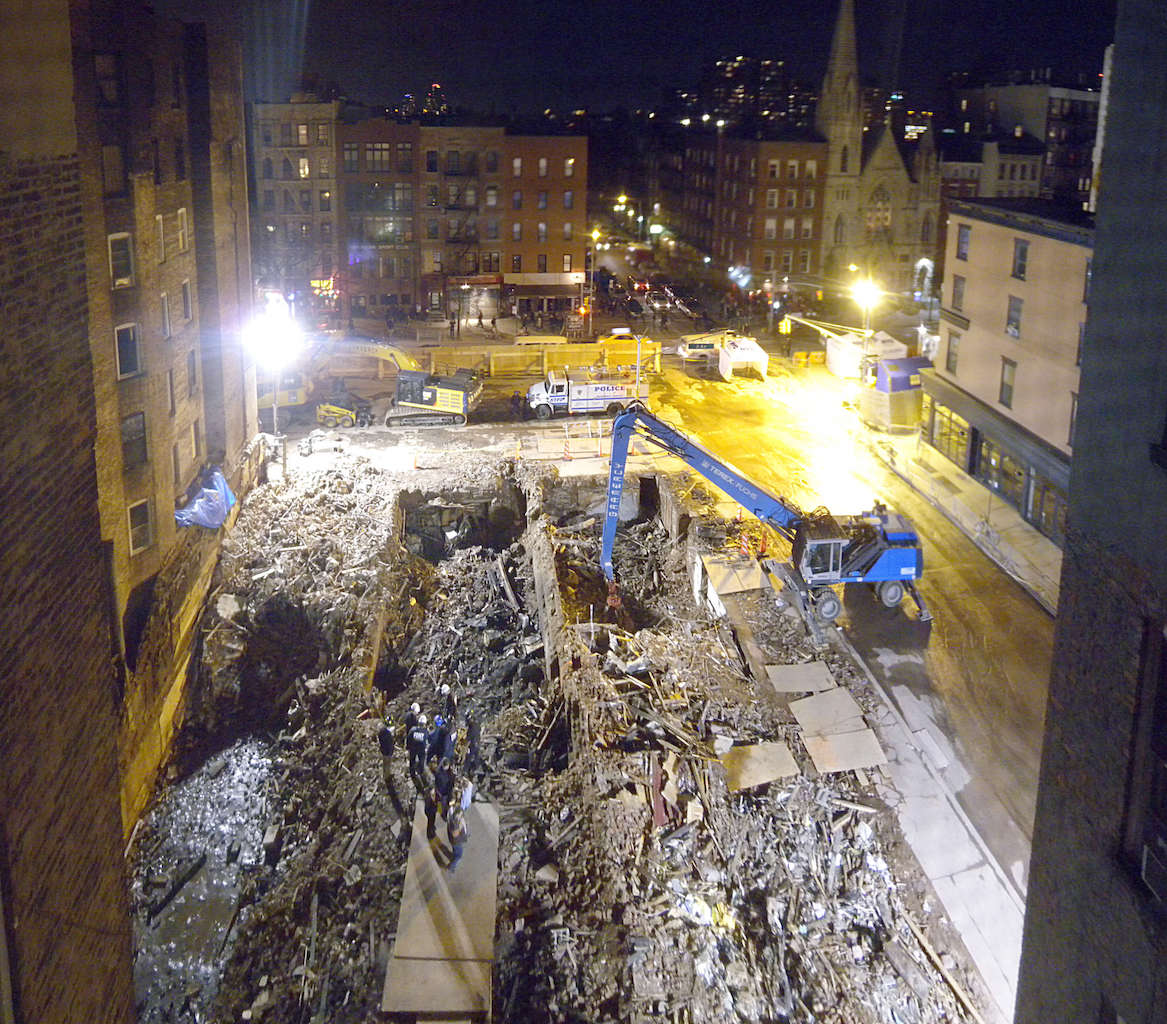
This February, Maria Hrynenko, 56, who owns 121 Second Ave. where the blast occurred, her son Michael Hrynenko, 30, contractor Dilber Kukic, 40, and plumber Athanasios “Jerry” Ioannidis, 59, were all charged with criminally negligent homicide and assault in the second degree in connection with the gas explosion.
In addition, Andrew Trombettas, 57, was charged with “renting” his master plumbing license to Ioannidis, so the latter could get work on the property approved, prosecutors said.
Manhattan District Attorney Cy Vance said the defendants set up an elaborate illegal gas line and hid the setup from inspectors, causing the explosion and subsequent fire. The court case was set to resume on Thurs., March 31.
On March 26, 2015, Michael Hryenko and Kukic ran out of 121 Second Ave. when the basement filled with gas, never warning building residents or patrons at Sushi Park, where Figueroa was paying his bill and Locón worked as a busboy.
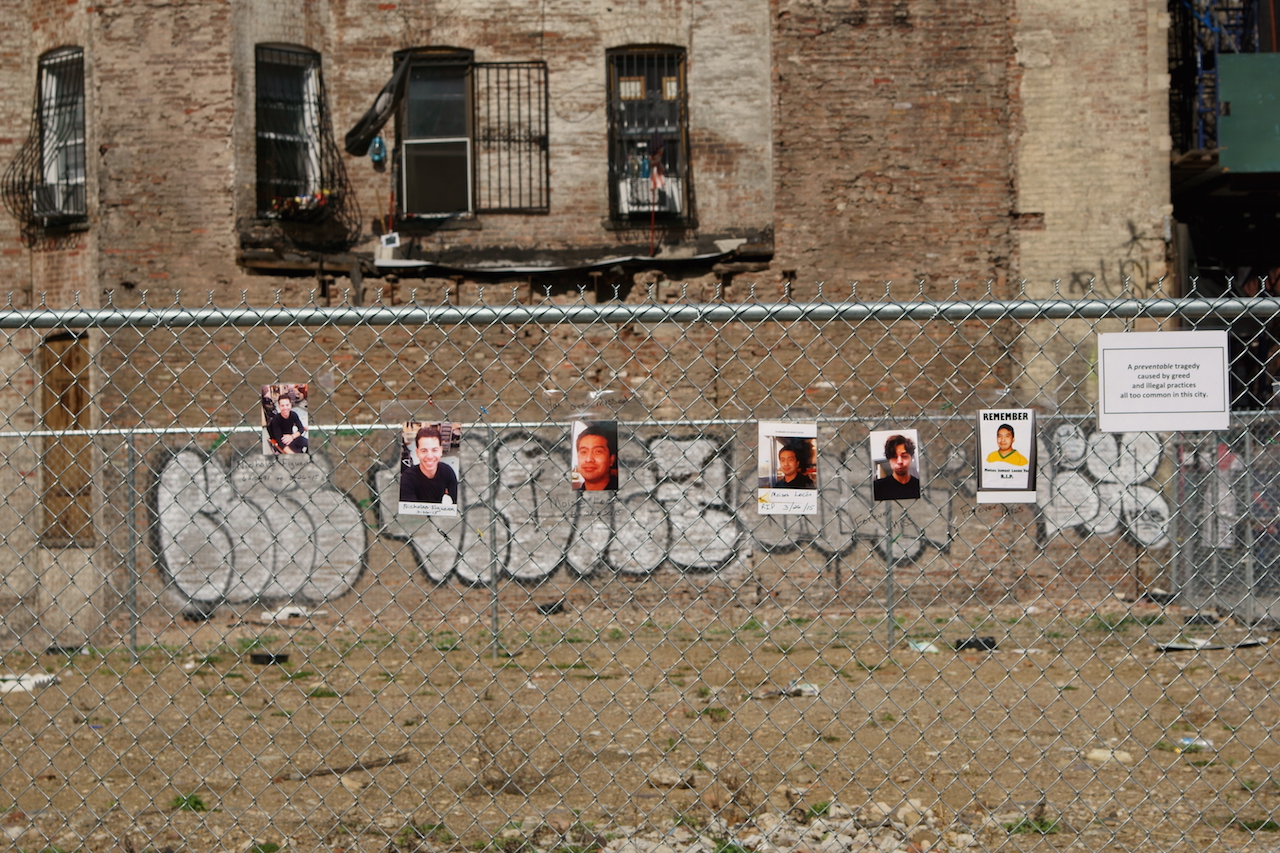
The City Council introduced nine bills last month that, among other things, would increase inspections of gas pipe systems, require better and more informative notifications to tenants about gas-related issues, increase transparency about the cause of gas-related violations and mandate natural-gas alarms in residential units.
Mendez is the lead sponsor of Intro. 1093, which would require gas providers to notify the Department of Buildings of a gas service shutoff within 24 hours.
“The city of New York is committed to preventing tragedies like this from happening again,” Mendez said. A hearing on the bills is set for June. “It sends a message to building owners who might be tempted to cut corners and find justice and is another step forward toward healing and closure that our neighbors need,” Mendez said.
“One year ago, we lost two innocent individuals due to greed and poor safety oversight,” said Assemblymember Deborah Glick. “This tragedy is a reminder that the pursuit of profits over people too often jeopardizes the safety of all New Yorkers.”
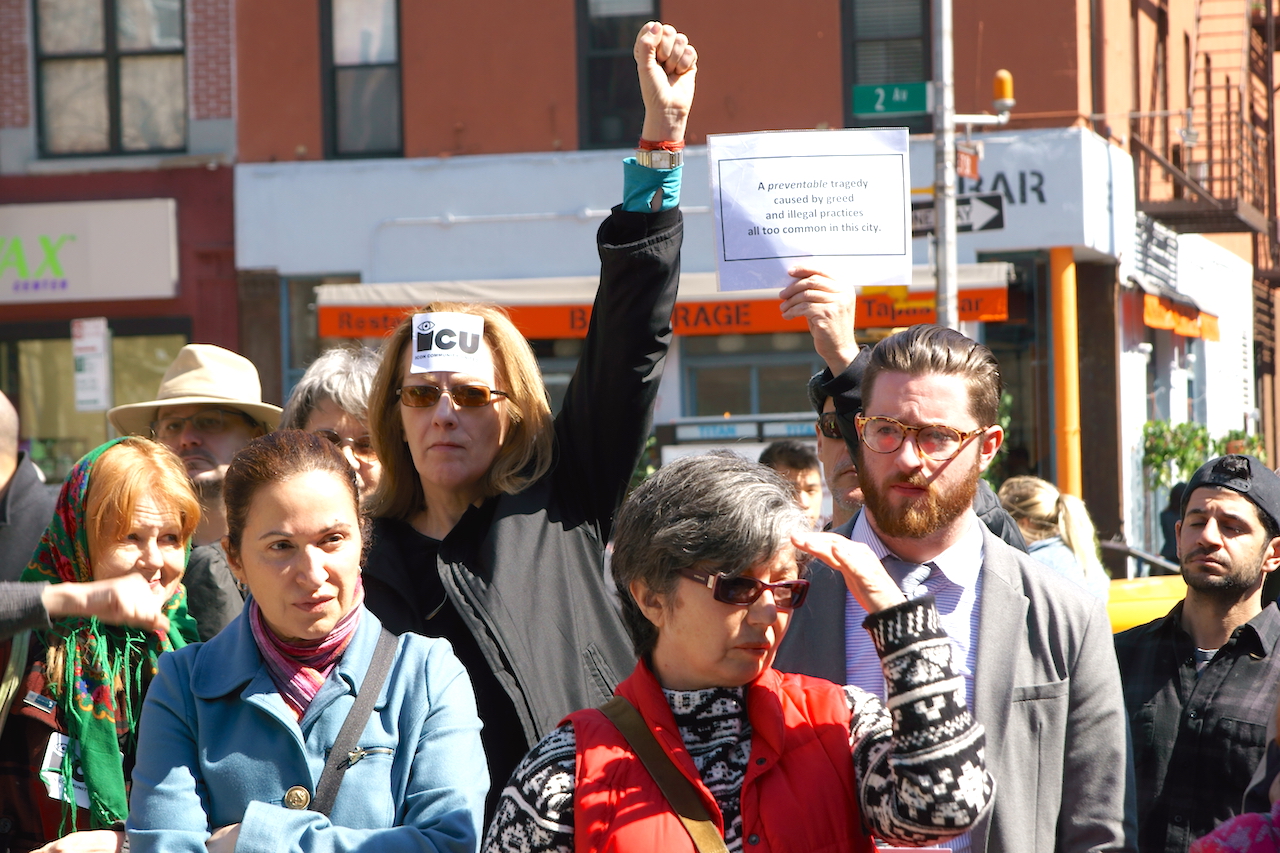
State Senator Brad Hoylman said the community still has a long way to go, and that part of the redress of justice is ensuring that none of the property owners involved see any profit from the future sale of the now-vacant properties. He added that part of the problem is that LLCs that are, in fact, “shell corporations,” need to be exposed to civil suits tied to litigation.
“You know how impressive a community is, how successful a community is when it comes together like it did one year ago,” Hoylman added.
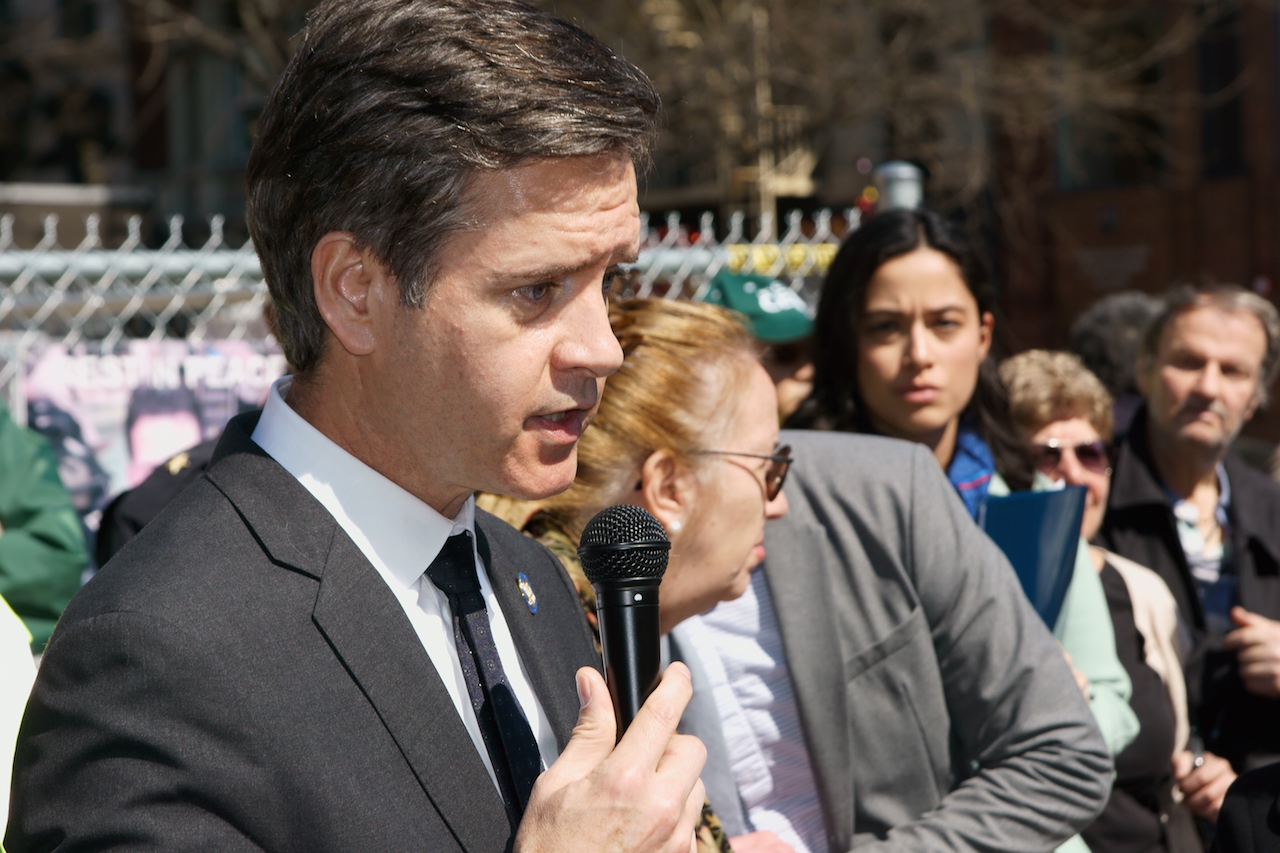
Also speaking at the press conference were Public Advocate Letitia James; Manhattan Borough President Gale Brewer; Damaris Reyes, chairperson of LES Ready and director at GOLES (Good Old Lower East Side); Gigi Li, chairperson of Community Board 3; and Tyesha Maddox, another displaced tenant, who had to vacate her apartment in the adjacent building at 125 Second Ave.
Guy said it’s still difficult to walk past the empty lot where her building once stood.
“It’s sad,” she said. “This was my home for 45 years.”
For a while after the explosion, Guy would walk home toward her old building on Second Ave. after work.
“It took me awhile to realize that this is not my home anymore,” she said.
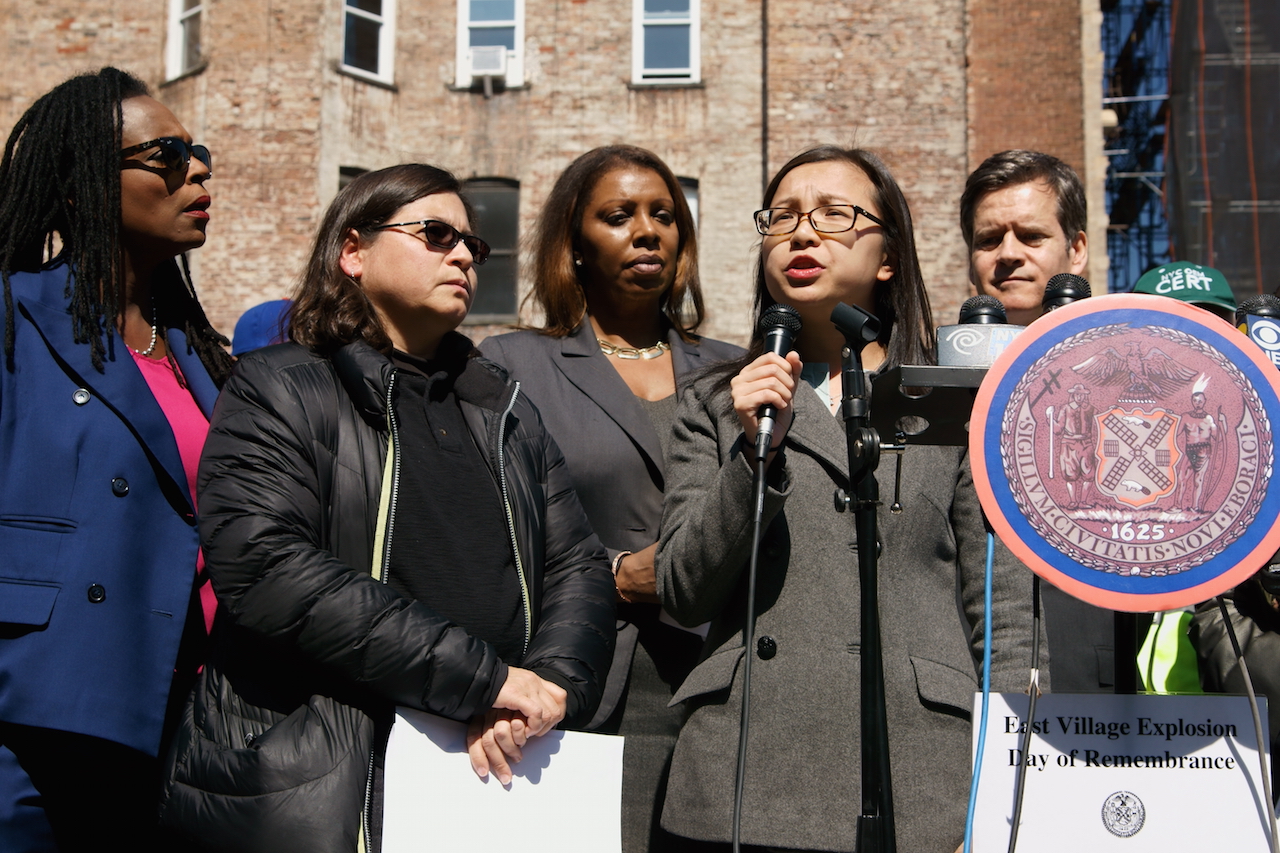
She is now living temporarily on E. Fourth St., thanks to the Cooper Square Mutual Housing Association. And she is still working at the Neighborhood School on E. Third St., where she is a veteran of 20 years.
Guy would like to see modestly sized affordable housing go up on the vacant lot, not market-rate condos. In the meantime, all she wants is to find a new place to call home permanently.
“I want to be able to find an affordable apartment again where my family can come and visit,” she said, “like Mommy’s Place.”
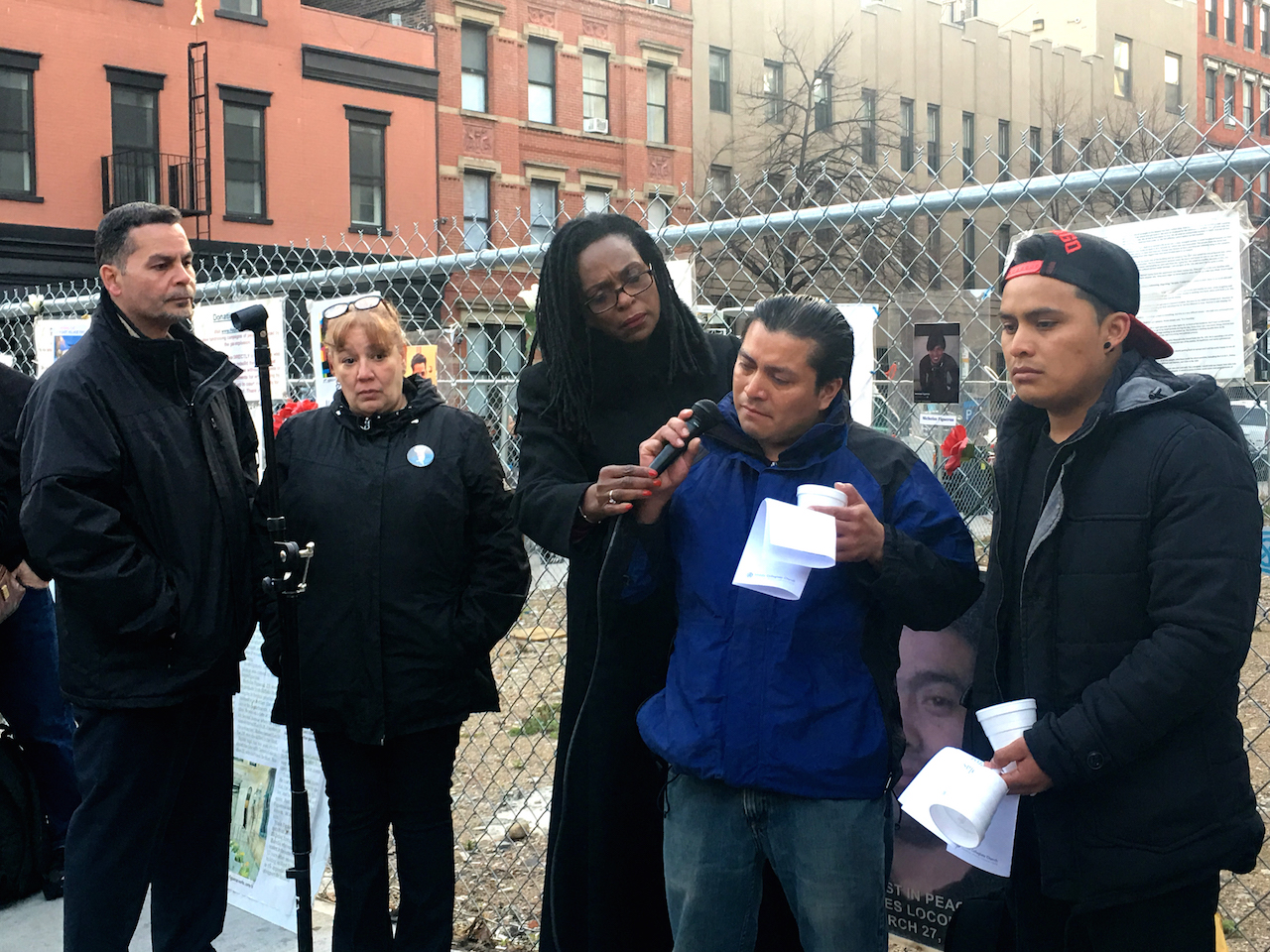
Later that afternoon, family members of the two men in their 20s who died in the disaster returned to the fenced-off lot for a memorial service for them. Joining them were local residents, business owners and anyone else who wanted to show support.
Those in attendance were asked to write words of remembrance for Moises Locón and Nicholas Figueroa on small white paper bags. Inside each bag, a candle was placed, and then each bag was laid down on the rubble-strewn ground in the center of the vacant site, forming a glowing white cross in remembrance of the two men.
Reverend Lewis of Middle Collegiate Church returned to lead the vigil — along with Figueroa’s parents and Locón’s brothers — reading scripture and leading the crowd in singing “Amazing Grace.”
In tears, Moises’ brother Alfredo, with his brother Zacharias beside him, shared his heartfelt remembrances about their lost sibling. Barely able to get her words out, Ana Figueroa spoke about her son.
“When a child dies, a parent loses a part of themselves and a part of their being, becoming a shell of a person they once were,” she said. “Death leaves a heartache no one can heal, but love leaves memories that no one can touch.”
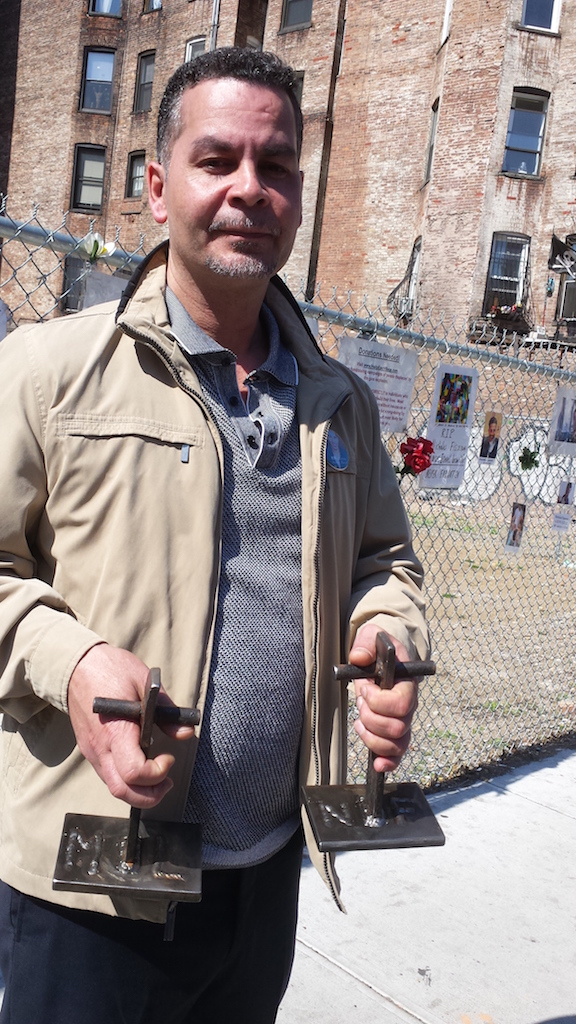
Before the vigil, The Villager spoke with Nicholas’s father, Nixon, who said that the day his son died, he died, too. He missed his father-to-son talks with Nicholas and his smile and laughter, he said.
The first firefighter up the building’s fire escape that day later cut one of the fire-escape ladders down to make two crosses with a base with the initials of Nicholas’s and Moises’ names.
“It’s a piece of history,” Nicholas’s father said, as he gripped the two small iron crosses in his hands. “It’s something to keep the memories of my son and Moises.
“Unfortunately, we have to be here for this,” he said. “I wish it was me that day. If I had a sense that he was in here, I would have went into the building and died myself.”
One year later, Figueroa’s parents still come down from the Upper East Side every Thursday to keep up the makeshift memorial to their son and Moises that festoons the gates around the fenced-in lot. Moises’ brothers regularly give them new photos to share for the memorial.
“Sometimes death has to happen to get things done,” Figueroa reflected. “Hopefully, this never happens again.”
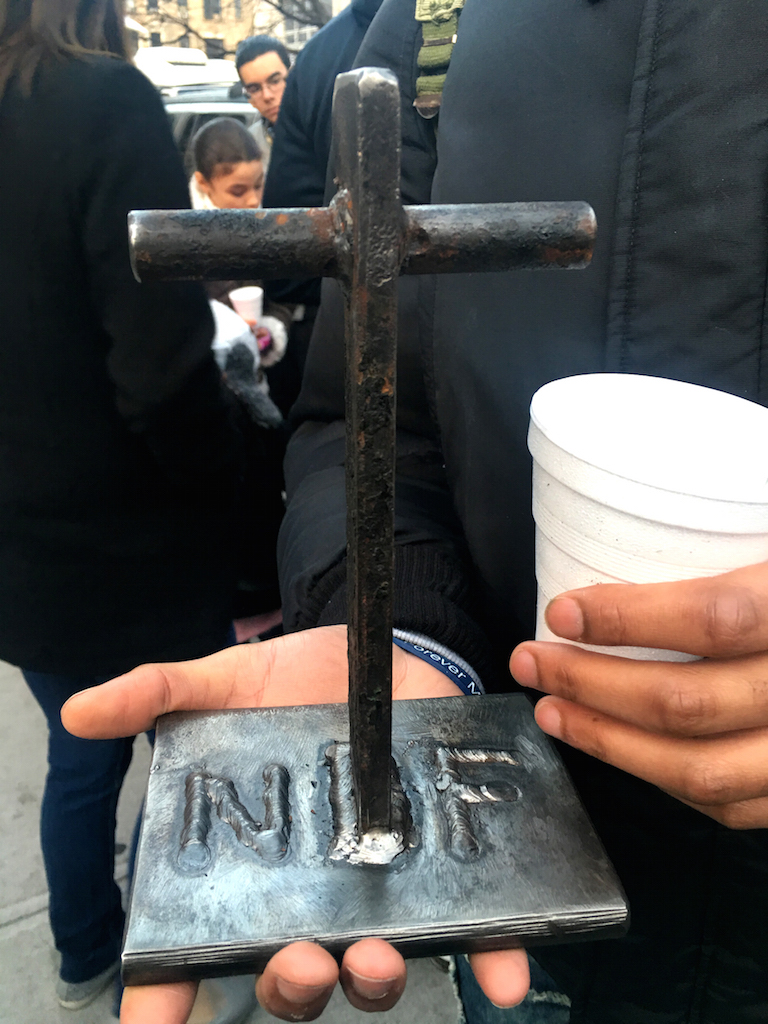
For local residents, the disaster’s one-year anniversary brought jarring memories flooding back of the tumultuous day that literally rocked the East Village.
Shep Wahnon moved to the neigborhood — just a block away from the explosion site — in 1981. He remembered hearing the explosion last March, and how everything then changed.
“It’s very sad,” he said. “You have this vacant spot. But restaurants and businesses were here, buildings with homes and people and a cat. All that is gone. It’s hard to believe. Memories are lost and what’s left behind is this big open sore that everyone sees when they pass by.”

Steve Herrick, executive director of Cooper Square Committee, said of the explosion, “It tore a hole in the heart of the East Village.”
Alex Gross, who lives nearby and moved to the neighborhood in 1959, didn’t want to come out to the one-year anniversary but felt he needed to be there with his community.
“I didn’t want to come today,” he admitted. “I’m touched by it and realized that I had to. It doesn’t look that doleful or sad.”
For sometime, Whanon would walk around the site to avoid seeing it. On the anniversary, he was slowly making his way around the fence, looking at photos of Lócon and Figueroa.
“It was because of the negligent landlord and could have been avoided,” he said. “I don’t know where the chain of command was but someone should have done something. Any one of these things can happen any day, anywhere in the city.”
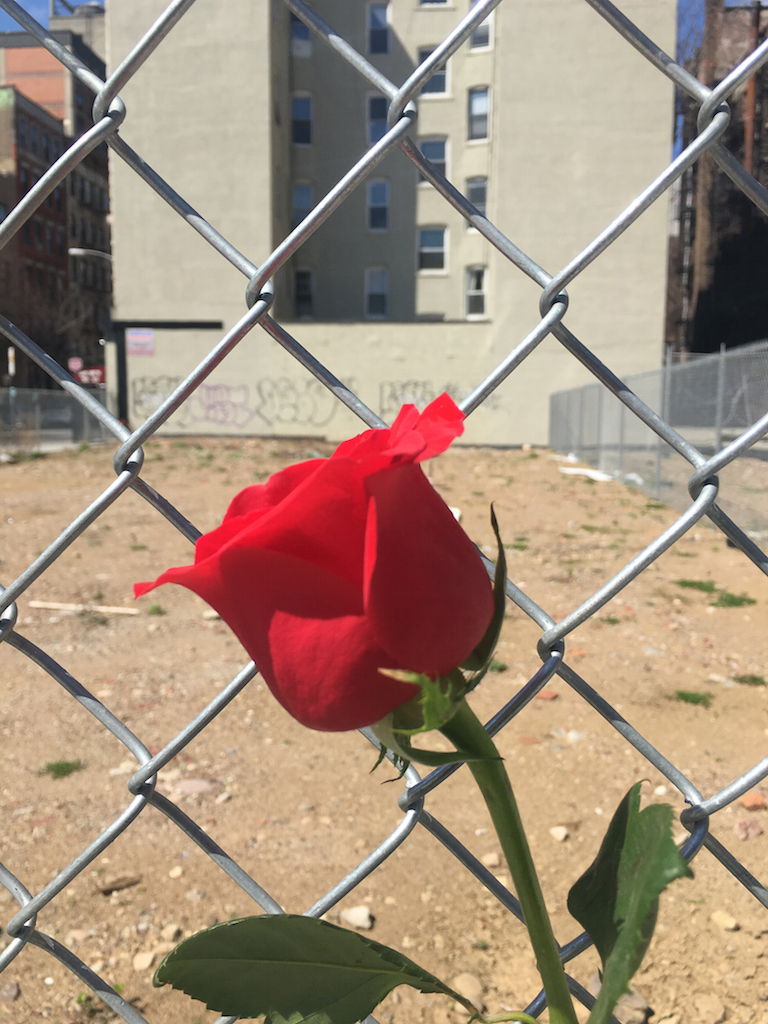
William Goodhart, also known as The Street Teacher, has been giving tours of the East Village for 20 years. He related the Second Ave. explosion to the Triangle Shirtwaist Fire, which killed 146 garment workers on March 25, 1911.
“I was thinking about this the other day, because it was the anniversary of the Triangle Fire,” he said. “How have we not caught up with all of this by now? This makes you wonder — it’s not just one building or these three buildings.”
Jean Standish, vice chairperson of the Bowery Alliance of Neighbors, vividly remembers the day last March when everything changed.
“I heard the explosion,” she said. “All emergency personnel were there and the Bomb Squad. I saw a man sitting on the sidewalk, blood coming from his head. It was a senseless thing.”
Whanon, like most residents, would like to see some type of memorial go up in the now-vacant lot. Standish, who has lived in the area since the 1960s, would be happy if a park filled the spot where the three buildings once stood.
“I love that people are still putting things up on the fence,” she said. “I’d love to see a memorial park with benches, a place where people can go… .
“I still love this neighborhood,” she said. “I didn’t realize how lucky I was when I first moved here.”
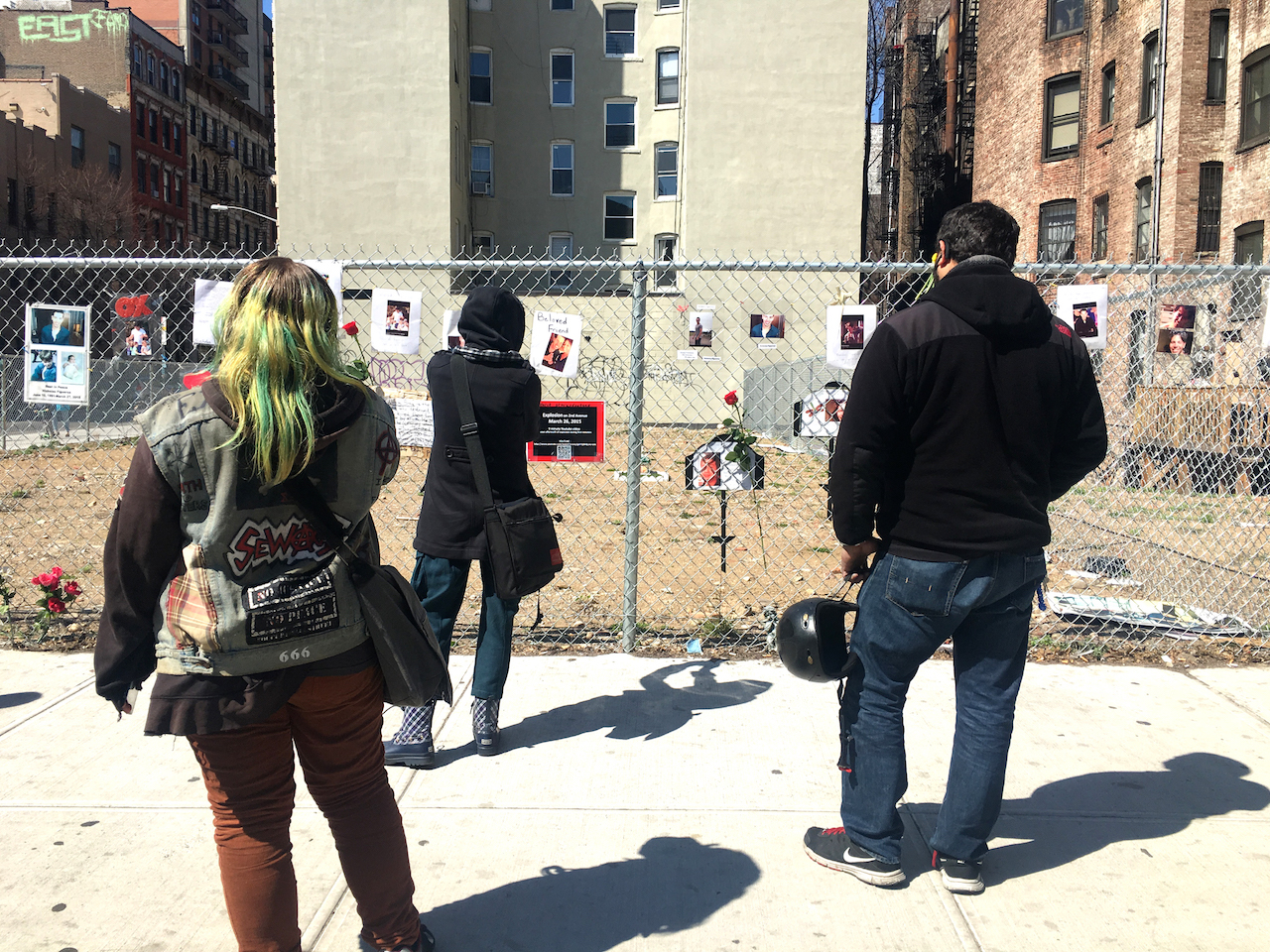
It’s a last-ditch effort for Stuart Lipsky. When he heard the explosion a year ago, he rushed to his building at 125 Second Ave. Within 10 minutes, Lipsky, a retired New York City science teacher, made it up to his apartment and grabbed one of his cats, but could not find the other — when his windows suddenly blew in. He wasn’t sure if his building would come down around him. Luckily, it survived.
A tenant at No. 125 for nearly four decades, Lipsky last Saturday was still putting up missing posters for his cat, Ryce — who would have turned one this April 15 — in a final attempt to be reunited with his missing pet.
“It’s not an anniversary I’m looking forward to,” Lipsky said before the press conference. “I’ve been there 37 years and didn’t need this.”
Most tenants in his building were reunited with their pets following the explosion. But Ryce, a Lynx Point Siamese cat, has never been found.
“The empty site I can deal with if my family was complete,” he said. “My wife and my daughter and I survived, and one of the cats. I feel guilty because when the windows started crashing in…we had to evacuate, I grabbed the one cat but not the other and regret it every day.”
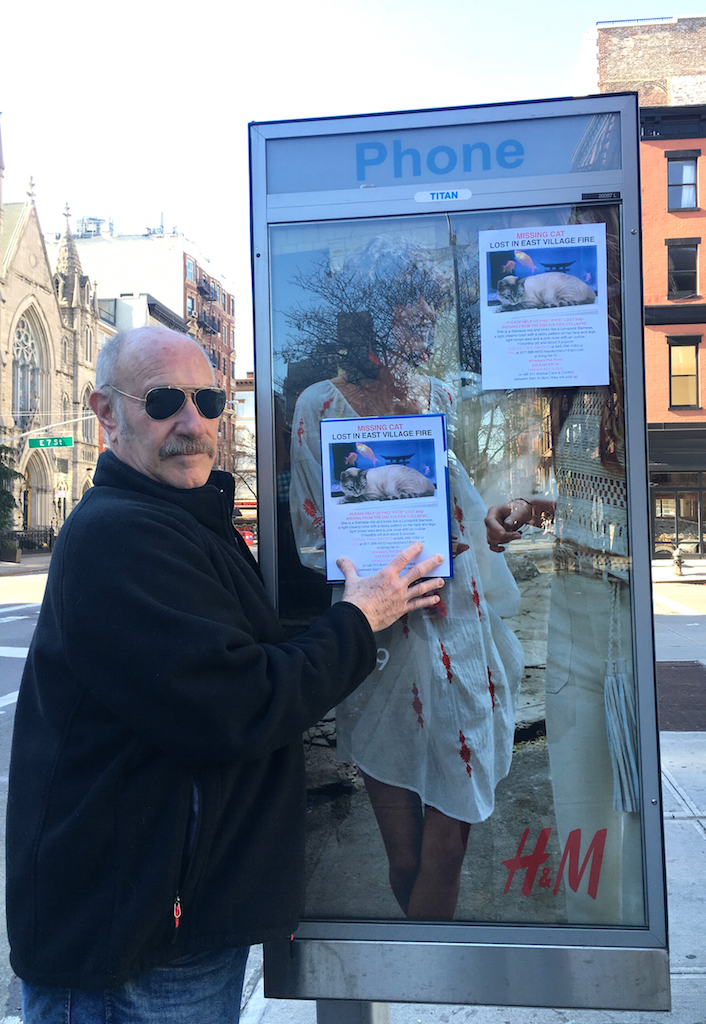
Everything happened so fast, but Lipsky clearly remembers seeing Pommes Frites, the Belgian fries place, on fire and hearing smoke detectors going off everywhere.
“All of a sudden normal turned into not-so-normal,” he said. “I didn’t think I had a few more minutes, I thought for sure this building was going to come down.”
The building didn’t come down, but his life — and the lives of so many others who were affected — was changed forever.
“Every time I wake up,” he said, “I check the locks, the smoke detector, make sure my daughter is O.K.”




